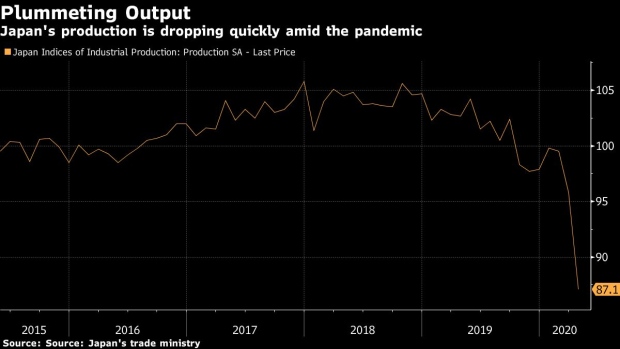May 28, 2020
Japan Factory Output Drops Most Since 2011 Quake, Tsunami
, Bloomberg News

(Bloomberg) -- Japanese factory output fell in April the most since the 2011 tsunami and retail sales plunged as the coronavirus froze demand at home and abroad and the recession deepened.
Industrial production 9.1% from March, dropping for a third month, the trade ministry reported Friday. Economists forecast a 5.7% drop. Retail sales fell 9.6% from a month earlier. The projection was for a 6.9% slide.
Separate figures showed the jobless rate holding up and Tokyo inflation picking up unexpectedly.
Key Insights
- Friday’s raft of data comes after Prime Minister Shinzo Abe’s government this week unveiled a $1.1 trillion economic package, doubling the total size of Japan’s virus responses to about 40% of the country’s gross domestic product.
- With the state of emergency having been lifted nationwide on Monday, the question now shifts to how quickly businesses can resume activity. Economists see the economy shrinking more than 20% this quarter, the most in records going back to 1955, and say a rebound could be slow as exports, tourism and business investment struggle to rebound.
- Abe’s approval ratings have fallen, so continued weakness in the economy is likely to keep pressure him to add more stimulus. Some analysts expect a third or even a fourth extra budget will be needed this year.
- Bank of Japan Governor Haruhiko Kuroda pledged to do whatever is needed to support the economy, but Friday’s data are unlikely to raise the odds of additional easing anytime soon because the results were broadly in line with expectations.
What Bloomberg’s Economist Says
“Production is likely to fall further in 2Q. High-frequency gauges pointed to weak electricity demand in May, even after the long holiday, reflecting suspensions of blast furnace facilities and other factories.”
Yuki Masujima, economist
Click here to read more.
Get more
- Tokyo’s consumer prices excluding fresh food rose 0.2% in May, compared with the median analysts’ estimate of -0.2%
- The jobless rate ticked up 0.1 percentage point to 2.6% in April. Analysts expected a slightly worse 2.7%.
- The jobs-to-applicant ratio worsened to 1.32, meaning there were 132 job offers for every 100 applicants. The number has fallen four months straight, the longest streak of declines since 2009.
- Retail sales declined 13.7% in April from a year earlier. The government placed the country under a state of state of emergency in mid-April.
(Adds chart and additional figures.)
©2020 Bloomberg L.P.